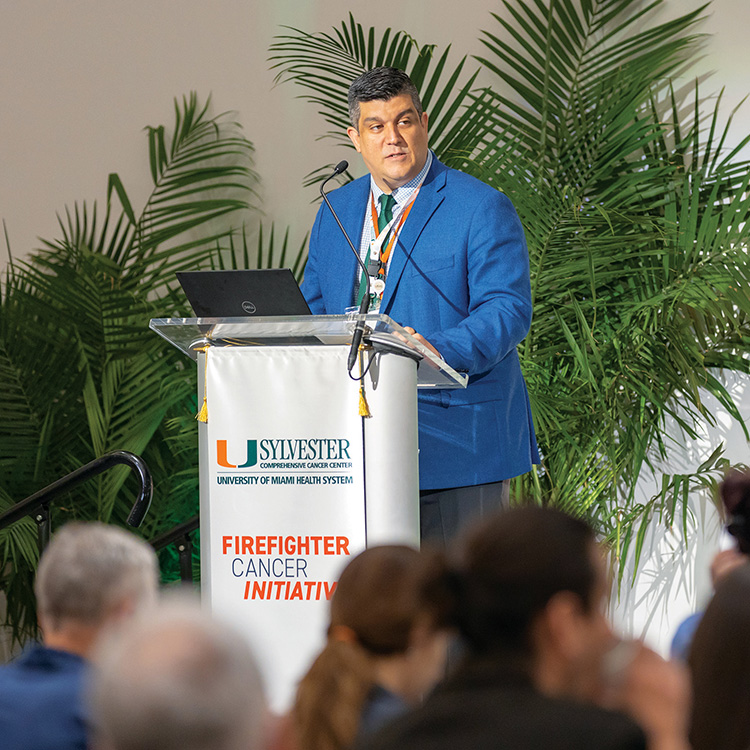The inaugural State of the Science National Firefighter Cancer Symposium brought together more than 325 firefighters, scientists, researchers, and other stakeholders from seven countries to the Shalala Student Center on June 10 and 11, 2019.
Their two-day mission at the University of Miami: to develop a scientific roadmap for controlling and preventing cancer for the nearly 350,000 career firefighters and more than 814,000 volunteers in the U.S. Fire Service.
“I haven’t seen the depth of this kind of science in one place,” said symposium co-chair Erin Kobetz, Ph.D., M.P.H., the director and principal investigator of Sylvester’s Firefighter Cancer Initiative, which is documenting the excess burden of cancer among Florida firefighters and identifying methods for reducing the risks that, not long ago, were on the radars of few researchers or firefighters.
“We have leadership from across the globe, scientists and firefighters alike, here to help us think through the most challenging research questions,” said Dr. Kobetz, professor of medicine and Sylvester’s associate director for population science and cancer disparity.
Symposium co-chair Alberto Caban-Martinez, D.O., Ph.D., M.P.H., assistant professor of public health sciences and deputy director of the Firefighter Cancer Initiative, expressed confidence that the collective knowledge and field expertise gathered for the first symposium of its kind will find answers.
“We are asking the bigger question of what is unknown, and what do we need to do in order to protect the men and women who come to our rescue when we need it most,” he said. “What happens here can indeed change firefighter health and safety.”
Over the past decade or so, multiple studies began showing that firefighters have higher rates of many cancers, including multiple myeloma, non-Hodgkin’s lymphoma, and prostate and testicular cancer, than the general population, and the reasons began to emerge: Every time firefighters respond to a fire, whether in a house, a dumpster, a car, or in wild lands, they can be exposed to an ever-increasing array of known cancer-causing agents and often bring the contaminants back to the station or home with them.

“Think about a simple dresser,” Dr. Caban-Martinez said. “Forty years ago it was probably built entirely from wood. Today it’s made of all these fancy things with all these plastics and synthetics. We think that’s part of the reason why we’re seeing higher rates.”
The other reason – the ingrained, tough-guy culture found in fire stations everywhere – brought Broward County Fire Rescue Lt. Lysander Rostow and Captain Alex Arreola, whose department recently lost two fellow firefighters to cancer, to the symposium. They came to learn the science that will help them convince their brethren to always wear their breathing masks and other safety equipment while fighting fires and to clean themselves, their truck, and their gear afterward, never storing it in their cabs, their sleeping quarters, or their homes.
“We are aggressively trying to change the culture of the fire service,” said Rostow, who, like Arreola, is a member of his department’s joint occupational safety and health committee. “Wearing dirty gear was a badge of honor. It showed you were a tough guy and worked hard. You would never wash your gear because you wanted everyone to see how salty you were.”
Nathan J. Trauernicht, the fire chief for the University of California, Davis, and one of the symposium keynote speakers, said firefighters can no longer ignore the data and the data is changing the culture.
“It’s making people have an aha! moment,” Trauernicht said. “There’s this really great movement now, and it’s going to be propelled by events like this, where we say, ‘This is not smart.’ We’re not any less because we clean stuff.”